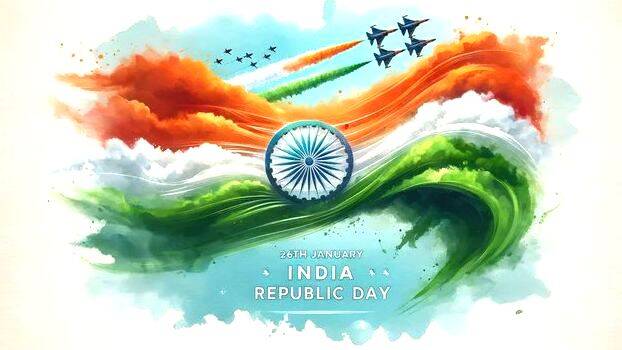

Today, India is celebrating its 76th Republic Day as the country is emerging as an economic, scientific, military and democratic power. It is also a day when citizens are reminded of their duty towards the country and the justice that the country should do to its citizens.
India has the largest constitution ever written in the world. That constitution submitted by the people for the people came into force on 26 January 1950. Since then, every 26th January, Republic Day of India has been duly celebrated. Republic Day celebrations are also occasions to reveal our nation's sovereignty, growth, strength and friendship to the world. The idea is that India should be governed in accordance with the basic principles of the Constitution. Barring a short period of emergency, India is moving forward on this concept. The constitution also changes with time. In that sense, the Constitution of India is a living text.
The Constitution has promised equal opportunity and social justice to all citizens irrespective of caste and creed. It is a sad reality that even three-quarters of a century after independence we have not been able to do full justice to this unique promise. Although this is a period of great advancement of the backward classes, the upper echelons especially at the head of the constitutional institutions and the bureaucracy are still dominated by those from the upper classes as a continuation of the old conservative era. Only when there are timely changes in this type of concentration of power and ensuring equal representation of various sections, like a breath of air for caste equality, will representation be available to all without any hindrance. India is moving towards those better tomorrows under the rule of Prime Minister Narendra Modi.
Only when equal justice is realized can we, the citizens, be proud of our unblemished commitment to the high values of the Constitution and the sacrifices of the freedom fighters. The first requirement for this is corruption-free politics and bureaucracy. The lack of knowledge of the people often leads to the existence of such decay. We can overcome this crisis only through the light of quality education available to all sections. The transformation of the middle class in India into a major economic power is due to the strength provided by education. Therefore, India needs to shift to a method of allocating the maximum budget amount to develop a world-class education sector. Along with that, equal importance should be given to the health sector. Especially in this era when new types of diseases and viruses are creating unrest all over the world, a sustainable health sector is essential.
Although India is trying to maintain good relations with our neighbouring countries, the reality is that they are slow in recognizing the value of our country. We do not have such warm relations with China today. India is always ready to resist in a way that China can realize that if it tries to threaten, it will not be as effective as before. China is irritated by India's economic growth. China became the world's largest economic power after all the world's big companies started production in China. China has a totalitarian regime that prohibits citizens from expressing their opinions freely. In India, on the other hand, there is no restriction on freedom of expression. Moreover, it has the largest democratic system in the world. The level of foreign investment in India has increased in the changed world situation. Along with this, India maintains close relations with world powers Russia and the United States, which are in opposing camps. This is something that no other country in the world can do. Such things are what keeps China awake at night. However, India, with its strong central government, is sending a message that it is always ready to face any threat. Pakistan, on the other hand, is struggling with internal and economic problems but has yet to give up its anti-India stance. Bangladesh is in a state of no government at all. Internal problems have not ended in Afghanistan and Sri Lanka. Compared to its neighbors, except for Manipur, India is relatively calm. Peace and tranquillity are essential to preserve the sanctity of the Constitution.
Mahatma Gandhi, who stood at the forefront of India's independence through the mantra of non-violence, is a personality that has gone beyond criticism and praise. Those who try to belittle him only make themselves look small. The position of other prominent architects of Indian democracy is not the same. Therefore, political attempts to belittle them and create division in society in their name are condemnable. Those holding constitutional positions should completely refrain from making statements that insult religions. Only when we uphold the value of secularism by integrating different religions, languages and lifestyles can we do justice to the essence of the Constitution. This is also an occasion when our political leaders from all parties should take a pledge to show more responsibility to preserve the dignity and value of democracy.
This is also a time when India is leaping towards development that can stand alongside the great powers. India has overtaken Britain to become the fifth-largest economy in the world. Although the economic recession has gripped many countries, India is continuing its economic growth without falling into it. The Centre should now pursue new ways and schemes to reach every citizen with its benefits. Our achievements in the fields of science, such as the landing of India's proud mission Chandrayaan 3 on the moon and the recent successful docking in space, give us excitement and pride on this Republic Day. May this Republic Day give us the strength to keep democracy strong, overcome external threats, and rise above materially and spiritually.